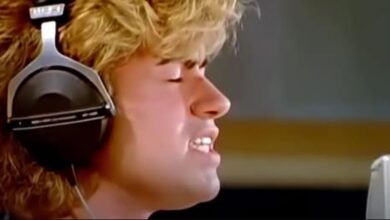Oh my goodness where has this video been.after all these years he still makes chills run up and down my spine
“After Loving You,” recorded by Elvis Presley, is a deeply emotive ballad that stands as an important part of his extensive musical legacy. Though not as widely recognized as some of his biggest hits, it showcases Presley’s remarkable versatility and ability to imbue his performances with profound emotional depth. This song fits into a period of Presley’s career where he was exploring various musical styles, blending pop, country, and soul influences. Here’s an extended look at the song and its significance in Presley’s career.
Presley recorded “After Loving You” in 1969 during the sessions that produced the celebrated *From Elvis in Memphis* album, marking one of the most creatively fulfilling periods of his late career. The song was originally written by Eddie Miller and Johnny Lantz and had been performed by several country artists before Presley lent his unique touch to it. Presley’s rendition of “After Loving You” transforms the song into a deeply soulful ballad, emphasizing his ability to interpret songs in a way that brought out emotional vulnerability.
Musically, the song blends elements of country and rhythm and blues, genres that had always been central to Presley’s work. This fusion is evident in the understated instrumentation, which features guitars, piano, and subtle percussion. The stripped-down arrangement allows Presley’s voice to shine, with his passionate delivery of the lyrics taking center stage. His vocal performance is filled with nuance, moving from a gentle croon to powerful crescendos that express the raw emotion of heartache and loss.
The lyrics of “After Loving You” deal with themes of love and heartbreak, common motifs in Presley’s ballads. In this song, the narrator reflects on the impossibility of moving on after experiencing a deep and profound love. Presley’s delivery of lines like “But after loving you, what else is there to do?” conveys a sense of hopelessness and resignation, underscoring the depth of his emotional connection to the material. His ability to embody the pain and longing in the lyrics is one of the reasons the song resonates so strongly with listeners.
Critically, “After Loving You” has been praised for its emotional intensity and for showcasing Presley’s vocal prowess. While it may not be as universally known as tracks like “Suspicious Minds” or “Love Me Tender,” it is beloved by fans and considered a hidden gem in his catalog. This period of Presley’s career, particularly the *From Elvis in Memphis* sessions, is often seen as a creative resurgence for him, and “After Loving You” is a prime example of his ability to deliver powerful performances well into the later stages of his career.
In terms of its place in Presley’s discography, “After Loving You” reflects his shift towards more mature, introspective material in the late 1960s and early 1970s. Following his 1968 Comeback Special, Presley was determined to prove that he was still a relevant and vital force in the music industry, and his work from this era is characterized by its emotional depth and genre-blending innovations. “After Loving You” fits into this narrative as a song that highlights his ability to adapt and evolve as an artist.
Live performances of “After Loving You” are rare, as Presley did not frequently include it in his concert setlists. However, it is likely that the song’s intimate, confessional nature made it more suited for the studio than the stage. Nonetheless, the recording itself has had a lasting impact, especially among fans who appreciate Presley’s more introspective material.
Elvis’s version of “After Loving You” also serves as a reminder of his deep connection to country music, a genre he often returned to throughout his career. Though primarily known for his contributions to rock and roll, Presley’s roots in country and gospel music informed much of his work, and “After Loving You” is a prime example of how he could seamlessly blend these influences into a cohesive and emotionally powerful whole.
As with many of his ballads, Presley’s interpretation of “After Loving You” allows him to tap into a universal theme—heartbreak—while also bringing his own personal experience and emotion to the performance. His voice, rich with experience and vulnerability, elevates the song from a simple love ballad to something much more profound, a reflection on the pain of losing someone you truly love.
In conclusion, “After Loving You” remains an important, if understated, part of Elvis Presley’s legacy. It showcases his ability to convey deep emotion through his voice, blending different genres to create something uniquely his own. For fans of Presley’s more introspective work, this song stands out as a powerful example of his artistry and emotional range. It serves as a reminder that while Presley was known as the King of Rock and Roll, his true gift was his ability to connect with listeners on a deeply personal level, transcending genre and style to deliver performances that still resonate today.





